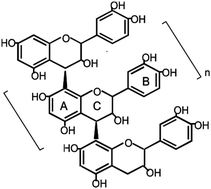Protective role of grape seed proanthocyanidins against cadmium induced hepatic dysfunction in rats
Abstract
Grape seed proanthocyanidins (GSP) are polyphenolic compounds which exert a novel spectrum of biological, pharmacological and therapeutic properties against oxidative stress. Recent findings have shown that GSP exhibit numerous antioxidant and free radical scavenging properties. So, it was of special concern to investigate the protective efficacy of GSP against cadmium induced hepatic dysfunction in rats. Male Wistar rats were treated with cadmium (Cd) as cadmium chloride (CdCl2, 5 mg kg−1 bw, orally) and orally pre-administered with GSP (100 mg kg−1 bw) 90 minutes before Cd intoxication for 4 weeks to evaluate hepatic damage of Cd and antioxidant potential of GSP. Our results demonstrate a significant (p < 0.05) increase in the levels of serum hepatic markers and hepatic oxidative stress markers and a notable (p < 0.05) decrease in hepatic enzymatic and non-enzymatic antioxidant contents along with histopathological alterations on Cd exposure. The GSP pre-treatment regimen was beneficial in the recovery of altered serum and hepatic biochemical and histological variables by Cd. Our results clearly indicate that the free radical scavenging and antioxidant potential of GSP benefits the recovery of rats exposed to Cd. We thus recommend that diets rich in GSP help in attenuating Cd-induced oxidative hepatic dysfunction in rats.


 Please wait while we load your content...
Please wait while we load your content...